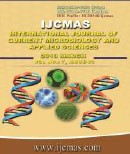


 National Academy of Agricultural Sciences (NAAS)
National Academy of Agricultural Sciences (NAAS)

|
PRINT ISSN : 2319-7692
Online ISSN : 2319-7706 Issues : 12 per year Publisher : Excellent Publishers Email : editorijcmas@gmail.com / submit@ijcmas.com Editor-in-chief: Dr.M.Prakash Index Copernicus ICV 2018: 95.39 NAAS RATING 2020: 5.38 |
Now a days agriculture is getting more and more dependent upon the supply of synthetic inputs such as chemical fertilizers, pesticides etc. which are inevitable to meet food demand for growing population in the world. However, excessive, imprudent and imbalanced use of inputs may throw devastating impacts on the water, air and soil environments. Probably the soil environment is the most vulnerable to the direct effects of these practices in modern agriculture. They could destroy the fertility of the soil in a long run which compels the scientific community to look for the alternatives like organic farming and integrated use of organic and inorganic fertilizers. In the present review, we discuss the role of INM in resolving these concerns, which has been proposed as a promising strategy for addressing these challenges. INM has multifaceted potential for the improvement of plant performance and resource efficiency while also enabling the protection of the environment and resource quality. Lower inputs of chemical fertilizer and therefore lower human and environmental costs (such as intensity of land use, N use, reactive N losses and GHG emissions) were achieved under advanced INM practices without any negative effect on crop yields. An available comparative literature research revealed that INM increases crop growth and yield of floricultural crops as compared with conventional methods. INM practices increases nutrients use efficiency and improving soil health and sustainability. Strong and convincing evidence indicates that INM practice could be an innovative and environment friendly practice for sustainable growth and yield of floricultural crops.
 |
 |
 |
 |
 |